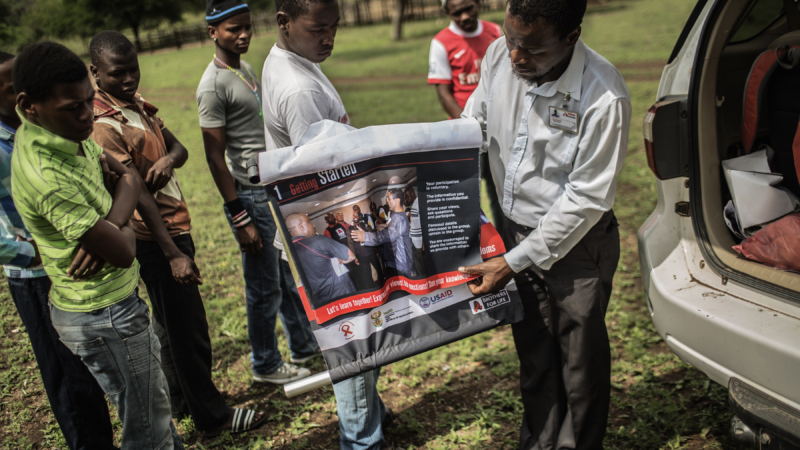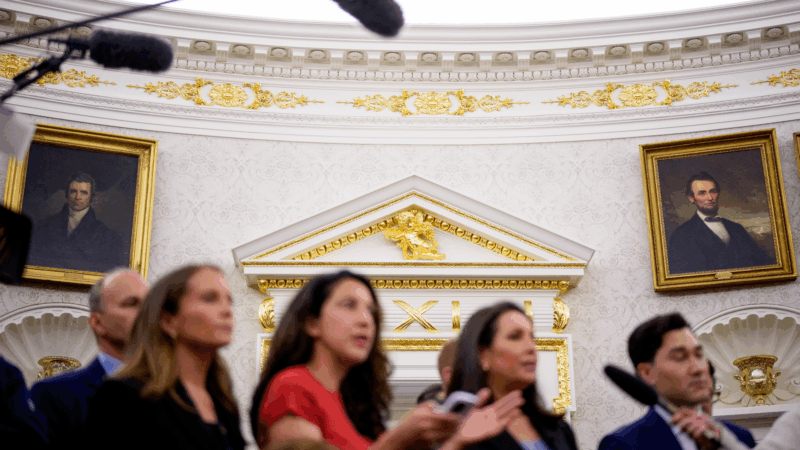Trump says ‘male circumcision in Mozambique’ is a ‘scam.’ What’s the program about?
In his joint address to Congress on Tuesday, President Trump took a jab at a number of foreign aid programs. “Just listen to some of the appalling waste,” he said and then rattled off a list of examples, including: “$10 million for male circumcision in Mozambique.”
He’s referring to one country but USAID — the United States Agency for International Development — has funded male circumcision programs in a number of countries in southern and eastern Africa through the U.S. President’s Emergency Plan for AIDS Relief (PEPFAR) program.
Public health experts and HIV prevention advocates agree that voluntary medical male circumcisions — a procedure where a medical provider removes the foreskin of a penis from a volunteer patient — are a highly effective prevention for HIV. The procedure has been shown to significantly reduce the risk of HIV transmission from women to men and is a cost-effective HIV prevention intervention in countries with high infection rates.
The procedure is recommended for males after the onset of puberty, when they are more likely to be sexually active, and differs from ceremonial circumcisions which are typically done by a non-medical provider in a non-medical setting. “The benefits of the procedure are for both [the patient] and their future partners, and ultimately, in a big way, for the community and country to reduce the spread of HIV,” says Anna Bershteyn, an associate professor of population health at the Grossman School of Medicine at New York University.
A local anesthetic is used in the procedure.
A 60% prevention benefit
Voluntary medical male circumcision became a gold standard for HIV prevention in the early 2000s, after three groundbreaking research studies from the National Institutes of Health and the French National Agency for Research on AIDS revealed that African countries with higher rates of male circumcision had lower rates of HIV infections.
“If a man is circumcised, it will reduce his chance of acquiring HIV by 60%,” says Mary Mahy, the director for Data for Impact at the Joint United Nations Programme on HIV/AIDS.
Scientists still don’t know for sure how removal of foreskin reduces risk of HIV infection, but research suggests that male foreskin has a larger number of a certain type of cells that HIV grabs onto. Bershteyn says there’s evidence that when the foreskin is removed during circumcision, the skin on the penis changes and the number of HIV-vulnerable cells on the skin’s surface is reduced.
“But aside from understanding the how, we have incredibly strong evidence from multiple randomized trials that, whatever the mechanisms, this procedure greatly reduces the risk of HIV infection,” says Bershteyn.
In 2007, on the heels of these research findings, the World Health Organization and the Joint United Nations Programme on HIV/AIDS began recommending voluntary medical male circumcisions in countries with high HIV prevalence and low rates of circumcision. Shortly after, PEPFAR, which is mainly overseen by USAID, stepped up its efforts to support male circumcision programs around the world, including in Mozambique.
“Over the last 18 years, governments around eastern and southern Africa, where there are high risks amongst men having vaginal sex, began to work with PEPFAR, the Global Fund and community groups and advocates to begin to scale up access to circumcision,” says Mitchell Warren, executive director of AVAC, an HIV prevention non-profit organization.
Warren notes that PEPFAR and other groups didn’t focus on circumcising men everywhere but instead used data-driven approaches to target specific regions that have high rates of HIV and low rates of circumcisions — including Mozambique. Since 2007, PEPFAR has supported 32.5 million voluntary medical male circumcisions in men and boys.
In Mozambique, the Mozambican Ministry of Health developed a national male circumcision strategy in 2009, with the support of PEPFAR. According to research from the U.S. Centers for Disease Control and Prevention, between 2010-2023, more than 2.5 million voluntary medical male circumcisions were performed in the country, with 41% in boys younger than 15. And among those who received circumcisions, less than 2% became infected with HIV. This research has yet to be peer-reviewed.
And unlike other prevention tools like oral pre-exposure prophylaxis (PrEP) and condoms, because the procedure only has to be done once, male circumcisions are cost effective as HIV prevention. “The investment made in voluntary male medical circumcision actually pays for itself relatively quickly,” says Bershteyn, and can “lighten the burden on governments and on donor agencies that are trying to prevent HIV deaths,” since protected individuals don’t require costly and lifelong treatments.
Warren says male circumcisions are “one of the best [HIV] prevention investments we have.”
NPR reached out to the State Department for comment on Trump’s remarks but did not receive a response in time for publication.
Bec Roldan is an independent science journalist based in Brooklyn, N.Y. They cover health and science topics and previously served as a AAAS Mass Media Fellow at NPR.
From chess to a medical mystery: Great global reads from 2025 you may have missed
We published hundreds of stories on global health and development each year. Some are ... alas ... a bit underappreciated by readers. We've asked our staff for their favorite overlooked posts of 2025.
The U.S. offers Ukraine a 15-year security guarantee for now, Zelenskyy says
Ukrainian President Volodymyr Zelenskyy said Monday the United States is offering his country security guarantees for a period of 15 years as part of a proposed peace plan.
Genre fiction and female authors top U.S. libraries’ most-borrowed lists in 2025
All of the top 10 books borrowed through the public library app Libby were written by women. And Kristin Hannah's The Women was the top checkout in many library systems around the country.
Why do so many people ring in the new year on Jan. 1?
Much of the world follows the Gregorian calendar, named after Pope Gregory XIII, who put the finishing touches on a Roman system that integrated ideas from other cultures.
A ‘very aesthetic person,’ President Trump says being a builder is his second job
President Trump was a builder before he took office, but he has continued it as a hobby in the White House.
Teens are having disturbing interactions with chatbots. Here’s how to lower the risks
Teen use of AI chat bots is growing, and psychologists worry it's affecting their social development and mental health. Here's what parents should know to help kids use the technology safely.







